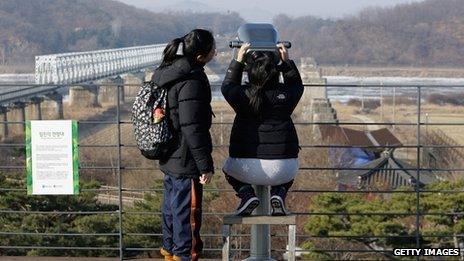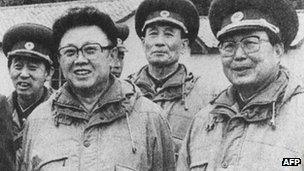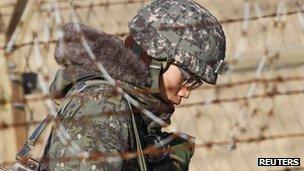Why succession poses tough challenge for both Koreas
- Published

Kim Jong-il's death will have repercussions on both sides of the border
The risks facing Kim Jong-un, third son and anointed heir of North Korean leader Kim Jong-il, who died of an apparent heart attack on Saturday, appear sterner today than those faced by his father when he took power in 1994.
"The dangers are much bigger for Kim Jong-un than they were for Kim Jong-il," said Kim Tae-woo of Seoul's Korean Institute for Defence Analysis. "North Korea's economic situation is worse now, and he is too young to have a powerbase or policy experience."
The surprise death of the senior Kim, 69, has massively accelerated a succession process inside the hard-line state: Kim's son, barely known and largely untried, has been dubbed by state media "the great successor to the revolutionary cause".
He is only 27 or 28 years old, and lacks any apparent revolutionary credentials beyond a physical resemblance to his grandfather, the revered national founder Kim Il-sung. He was only revealed to the public in September 2010 (though is believed to have been chosen as successor in late 2008).
By comparison, Kim Jong-il was 52 when he took power and had been groomed for succession since 1980. He also became chairman of the powerful National Defence Commission (from which he took his official title as leader) in 1993.
While Kim inherited a poor country, it was not impoverished. By the time famines began devastating North Korea in the late 1990s, he was firmly entrenched in Pyongyang, having been declared party head in 1997, and also had an international treaty in place on his nuclear programmes (the now-defunct "Agreed Framework" of 1994).
The young Kim, on the other hand, inherits a land with a per capita GDP of US$1,200, in which a quarter of the people, according to the UN, suffer food shortages, and which faces sanctions and international pariah status over Pyongyang's ongoing atomic arms programmes.
Yet 2012 is the year Pyongyang has told its citizens North Korea will be "a strong and prosperous country".

The country Kim Jong-il inherited was in far better shape than the one he leaves his son
Next year, when Kim Jong-un might hope to be solidifying his powerbase, there will be leadership transitions in China, Russia, South Korea and the United States, adding diplomatic uncertainties to his problem list. And while Kim Jong-il was engaged by the Clinton White House, Kim Jong-un faces a cynical Obama administration
Moreover, questions hang over his official position. Kim Jong-un is a member of the Politbureau's Standing Committee, but not of the National Defence Commission (though his father-in-law and presumed "regent", Jang Song-thaek, is).
There is also a question of elite loyalty. His elder half-brother, Macau resident Kim Jong-nam, has stated publicly he does not favour Kim Jong-un's succession. There is reported tension between party and military, and even his father took three years to fully establish power; he appears to have bought off the army with his "Songeun" ("Military First") policy.
This raft of problems leaves Kim with limited wriggle room.
"Kim Jong-un has essentially been handed the same poison chalice his father was," said Michael Breen, a biographer of Kim Jong-il. "There is no way out for this country but more of the same; if they acknowledge past wrongs, the chances of the regime and the state collapsing are high."
Seoul's dilemma
For South Korea, the pros of a best-possible case scenario - regime stabilisation, followed perhaps by a China-style economic liberalisation and return to nuclear talks - are massively outweighed by the cons of a worst-possible-case scenario - instability, factional infighting, a military coup, refugee flows, possible civil war, nuclear weapons at large and Beijing and Washington in disagreement or even conflict.
This combination of circumstances explains South Korea's shock at the death of a man who was viewed as an odious dictator: At least he was a known quantity. The country is jumpy, especially given the stock market's 3.4% plunge on the day Kim Jong-il's death became known.

After a year of highly tense ties, should South Korea offer condolences to the North?
While the market customarily shrugs off missile launches, nuclear tests and military attacks, there is concern that ongoing uncertainty will trigger longer-term volatilities.
However, lacking diplomatic relations or even high-level communication channels with North Korea, there is little Seoul can do but - to quote two terms in frequent use at present - "wait and see" while "monitoring events carefully".
It is certainly treading warily. Seoul's hawkish defence minister, Kim Kwan-jin, said he was reconsidering plans proposed by Christian factions inside South Korea's military to light up provocative Christmas trees along the border.
A pressing issue is now arising. After North Korean naval and military attacks which killed 50 South Koreans in 2010, Seoul halted high-level contact with Pyongyang, demanding an apology before their resumption. The question now is whether Seoul should send condolences to Kim's state funeral on the 28th - a major issue for face-conscious North Korea.
When Seoul called Kim Il-sung a war criminal after his 1994 death, a promising inter-Korean summit was snuffed and relations poisoned for years. The government, under opposition urging, says it is considering issuing condolences.
However, there are some pluses on the international front.
South Korean President Lee Myung-bak and US President Barack Obama spoke within hours of the death announcement, and appear to be in lock-step.
Beijing and Seoul, often at loggerheads over North Korea policy, currently share the same ambition: To maintain stability on their respective northeastern and northern borders.
Andrew Salmon is the Seoul-based author of the Korean War histories To The Last Round: The Epic British Stand on the Imjin River, Korea, 1951, and Scorched Earth, Black Snow: The Commonwealth Vs Communism, Korea, 1950